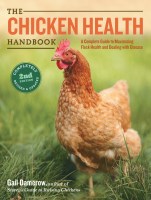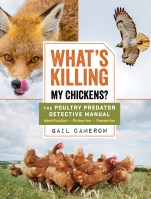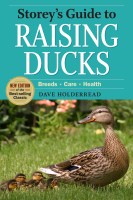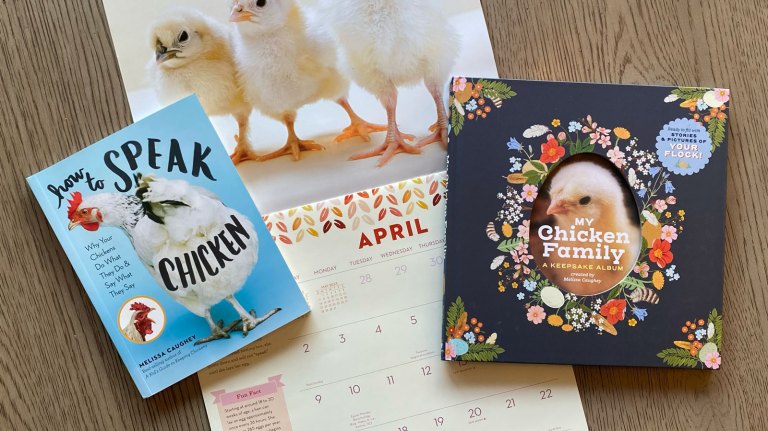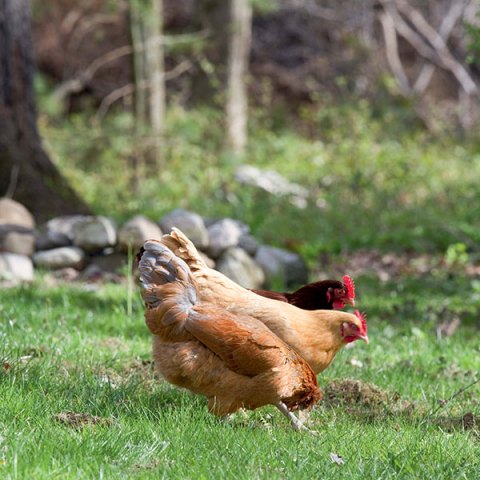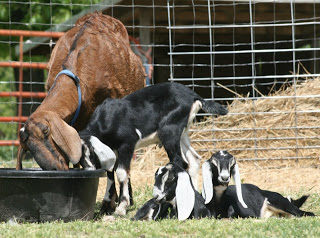Can You Keep Ducks and Chickens Together?
Duck… duck… chick! Before you try raising different types of backyard birds, it’s important to understand the differences between what they need and how they behave.
Since ducks became popular following the latest round of chicken mania, people often ask whether ducks and chickens can be kept together. A lot of people who consider getting ducks for the first time already have chickens. Others acquire ducks first and then wonder about the wisdom of also getting chickens. So, can ducks and chickens coexist? The answer is yes and no.
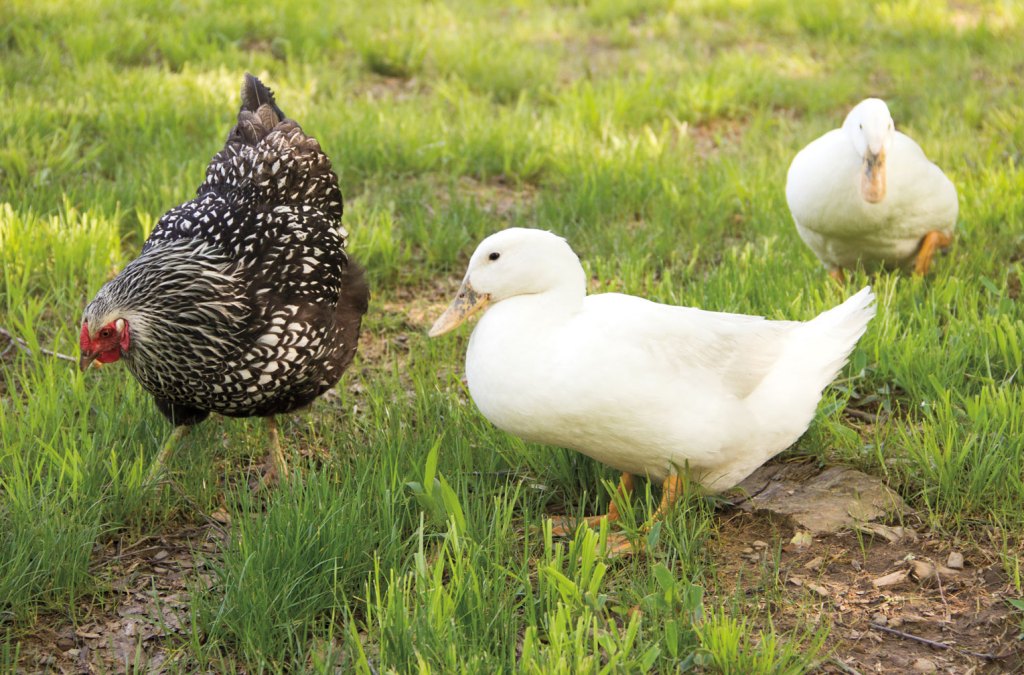
Differences between Ducks and Chickens
First let’s look at some of the major differences between ducks and chickens and what they need.
Housing needs. A duck coop need not be as exacting as a chicken coop and therefore can cost considerably less to build or buy. With the exception of Muscovies, ducks don’t roost for the night and therefore don’t require perches. Ducks (again, except Muscovies) lay eggs on the ground, so they don’t require elevated nests. Ducks have a slightly higher normal body temperature than chickens (107.8°F/42.1°C versus 107.1°F/41.7°C). That means they suffer a little less in warm weather and are less sensitive to cold weather and therefore don’t require winter-fortified housing.
Yard requirements. Ducks, unlike chickens, won’t quickly turn their yard into hardpan and won’t dig ankle-wrenching dust-bathing bowls. On the other hand, given the opportunity, ducks will create a muddy mess around their drinking water station and/or wading pool. And, if the duck yard is too small for the number of ducks, their copious quantity of nitrogen-rich droppings will eventually kill the vegetation.
Confinement. Ducks are easier to confine than chickens. For instance, if you want to confine them to a portion of your garden, all you need for most duck breeds is a foot-tall fence or other barrier of similar height. Chickens would have no trouble getting over such a low obstacle. They also have no trouble hopping into a foot-high raised bed that would defy most ducks. Chickens jump easily; ducks not so well.
Poop production. Like chickens, ducks don’t pee but combine their urine output with poop as whitish urates. However, the average duck poops about twice as much per day as the average chicken. And a duck’s droppings are more soupy than chicken droppings.
Brooder needs. With the exception of delicate bantams, ducklings are much hardier than chicks and less susceptible to chilling. They therefore are much less likely to die in the brooder. They also grow faster, so they need much less time in the brooder than chicks.
Sleep habits. Unlike chickens, ducks don’t sleep all night. Rather, they take catnaps at night, just as they do during the day. Unlike chickens, ducks can see in the dark, and if not closed up in their coop they will wander in and out all night long.
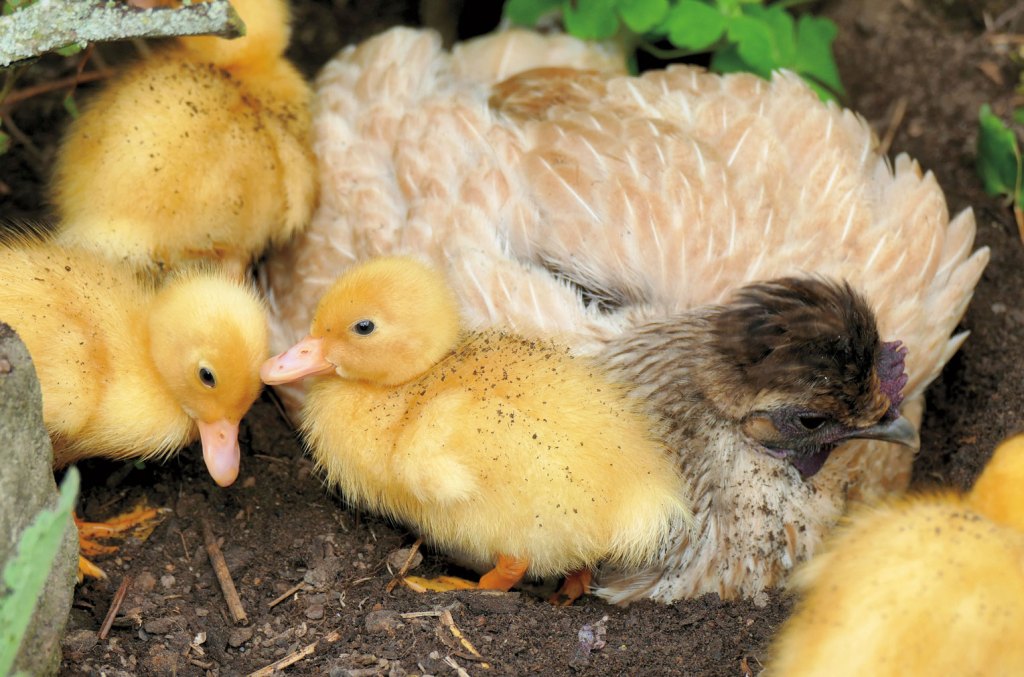
Health issues. Ducks are much less susceptible to disease than chickens. While chickens are subject to any number of diseases (which led me to write The Chicken Health Handbook), ducks rarely get sick. Ducks, especially those with access to sufficient water for bathing, are far less likely than chickens to suffer from internal and external parasites—mites, lice, and worms.
Predators. Ducks are more susceptible to predation than chickens. They can’t run as fast and they tend to stick together where chickens will scatter, making ducks easier for a predator to catch.
Molting patterns. Ducks, like chickens, molt annually in the fall. After this molt, mallard-derived drakes take on the same plumage pattern as the hens. In early spring the drakes go through a second, partial, molt to resume their brighter colors.
Egg production. Duck hens are productive two to three times longer than chicken hens. Where a chicken hen’s egg production markedly declines after the second year, duck hens lay well into their fourth year and sometimes beyond. On the other hand, some duck breeds lay only seasonally, rather than year round.
Meat production. Duck and chicken are both technically classified as white meat, although duck meat is darker because it is higher in iron and the red protein myoglobin. For practical purposes, therefore, duck meat is treated as red meat.
Behavioral Differences
Swimming ability. If the duck pool is shallow, chickens might stand in the water to cool off on a hot day. But chickens don’t have waterproof plumage, like ducks do, and they don’t have webbed feet for mobility in water. Although chickens can enjoy taking an occasional swim under supervision, an unsupervised chicken that accidentally finds itself in deep water can get waterlogged and drown. Well, under certain circumstances a duck, too, can get waterlogged and drown.
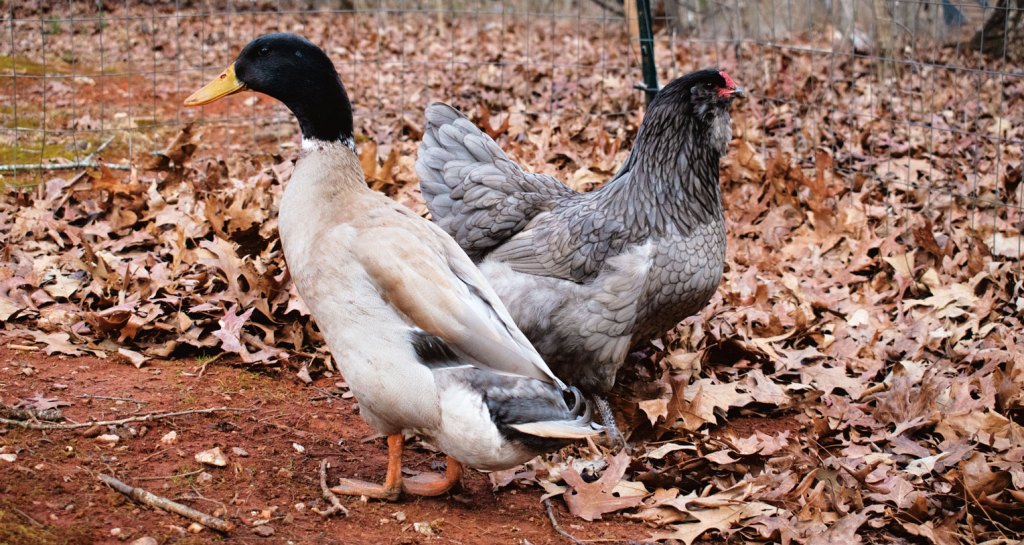
Friendliness. The calmer duck breeds, especially females, tend to be a bit friendlier than most chicken breeds. Chickens spend a lot of time enforcing the pecking order, something ducks don’t seem to care much about. While chickens can make good pets, ducks tend to be less cautious and more curious and therefore attach to humans more quickly. Because ducks are inclined to follow the leader, they are easier to herd. Herding chickens is a lot like herding cats.
Cannibalism. Ducks are not cannibalistic, like chickens can be. They don’t peck at each other (although they do occasionally fight), and they don’t eat their own eggs.
Excerpted and adapted from An Absolute Beginner’s Guide to Raising Backyard Ducks © Gail Damerow.
Ducks are quickly gaining on chickens as popular animals for the backyard homestead or small farm. They are friendly, productive, good at eating pests, remarkably healthy, and easier to raise than chickens in many ways. Plus, they are exceptionally adorable! This accessible introductory guide features original photography tracking the growth and care of a small flock of backyard ducks, and addresses everything the beginner duck keeper needs to know to be successful, including breed selection, housing, feeding, health care, understanding behavior, and egg and meat production.



